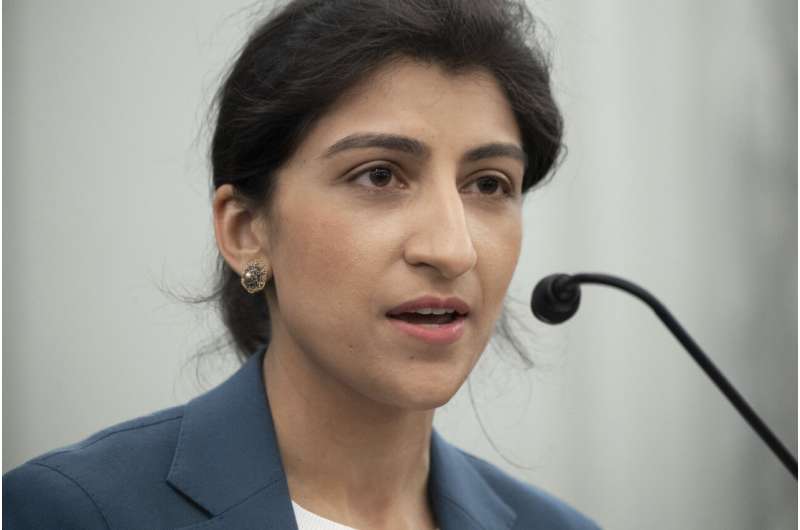
U.S. antitrust enforcers are opening an inquiry into the relationships between leading artificial intelligence startups such as ChatGPT-maker OpenAI and the tech giants that have invested billions of dollars into them.
The action targets Amazon, Google and Microsoft and their sway over the generative AI boom that's fueled demand for chatbots such as ChatGPT, and other AI tools that can produce novel imagery and sound.
"We're scrutinizing whether these ties enable dominant firms to exert undue influence or gain privileged access in ways that could undermine fair competition," said Lina Khan, chair of the U.S. Federal Trade Commission, in opening remarks at a Thursday AI forum.
Khan said the market inquiry would review "the investments and partnerships being formed between AI developers and major cloud service providers."
The FTC said Thursday it issued "compulsory orders" to five companies—cloud providers Amazon, Google and Microsoft, and AI startups Anthropic and OpenAI—requiring them to provide information about their agreements and the decision-making around them.
Microsoft's years-long relationship with OpenAI is the best known. Google and Amazon have more recently made multibillion-dollar deals with Anthropic, another San Francisco-based AI startup formed by former leaders at OpenAI.
Google welcomed the FTC inquiry in a statement Thursday that also took a not-so-veiled dig at Microsoft's OpenAI relationship and its history of inviting antitrust scrutiny over its business practices.
"We hope the FTC's study will shine a bright light on companies that don't offer the openness of Google Cloud or have a long history of locking-in customers—and who are bringing that same approach to AI services," Google's statement said.
Microsoft's Rimy Alaily, a corporate vice president for competition and market regulation, also said the company looks forward to cooperating with the FTC and defended such partnerships as "promoting competition and accelerating innovation."
Amazon, Anthropic and OpenAI declined comment.
The European Union and the United Kingdom have already signaled that they're scrutinizing Microsoft's OpenAI investments. The EU's executive branch said this month the partnership might trigger an investigation under regulations covering mergers and acquisitions that would harm competition in the 27-nation bloc. Britain's antitrust watchdog opened a similar review in December.
Antitrust advocates welcomed the actions from both the FTC and Europe on deals that some have derided as quasi-mergers.
"Big Tech firms know they can't buy the top A.I. companies, so instead they are finding ways of exerting influence without formally calling it an acquisition," said a written statement from Matt Stoller, director of research at the American Economic Liberties Project.
Microsoft has never publicly disclosed the total dollar amount of its investment in OpenAI, which Microsoft CEO Satya Nadella has described as a "complicated thing."
"We have a significant investment," he said on a November podcast hosted by tech journalist Kara Swisher. "It sort of comes in the form of not just dollars, but it comes in the form of compute and what have you."
OpenAI's governance and its relationship with Microsoft came into question last year after the startup's board of directors suddenly fired CEO Sam Altman, who was then swiftly reinstated, in turmoil that made world headlines. A weekend of behind-the-scenes maneuvers and a threatened mass exodus of employees championed by Nadella and other Microsoft leaders helped stabilize the startup and led to the resignation of most of its previous board.
© 2024 The Associated Press. All rights reserved. This material may not be published, broadcast, rewritten or redistributed without permission.
Citation: FTC opens inquiry into Big Tech's partnerships with leading AI startups (2024, January 25) retrieved 25 January 2024 from https://techxplore.com/news/2024-01-probe-tech-giants-ai-investments.html
This document is subject to copyright. Apart from any fair dealing for the purpose of private study or research, no part may be reproduced without the written permission. The content is provided for information purposes only.
